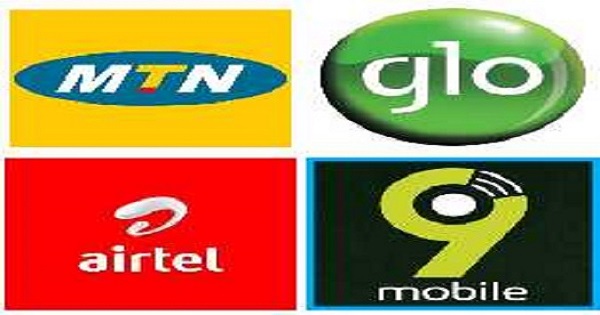Telecom
Telcos Lose 14.3m Subscribers in One Year — Report

Telecommunication companies in Nigeria have lost about 14,348,738 subscribers between September 2020 and September 2021, an analysis of data on the Nigerian Communications Commission (NCC) website.

According to industry statistics on the NCC portal, in September 2020, telecommunication companies had 204,869,652 subscribers as of September 2020.
However, by September 2021, the telcos subscriber base had dropped to 190,520,914. The 14,348,738 reduction in the subscriber base means the telcos lost seven per cent of their subscribers in one year.
According to the Association of Telecommunications Companies of Nigeria (ALTON), the industry Average Revenue Per User (ARPU) for 2020 was N1,420. Using this as a baseline, telcos may have lost about N20.36bn in revenue in the period under review.
Among the telcos, MTN lost 9,068,156 subscribers; Globacom lost 1,319,560; Airtel lost 4,215,233. However, 9mobile gained subscribers (254,211), making the only operator that did not lose subscriber in the period under review.
During the period, about 11,140,734 data subscribers were lost by the telecom firm while the national broadband penetration dropped from 45.43 per cent to 40.01 per cent.
In December 2020, the Federal Government moved to enforce the linkage of National Identity Numbers to Subscriber Identity Module in an effort to boost national security.
The government subsequently banned the sale of SIMs and set a deadline for subscribers to link their SIMs to NINs.
Telecom
MTN @ Swish Fusion Summit, Showcases 5G Rollout Strategy

MTN Nigeria Communications Plc has joined other professionals across media, technology, and business gathered in Lagos for the Swish Fusion Tech and Media Summit.

Themed ‘Africa: Big Wins & New Breaks’, the summit drew thousands of attendees and featured more than 40 speakers exploring the intersection of innovation, regulation, and economic growth across the continent.
Among the sessions, MTN Nigeria presented a detailed look at the company’s ongoing 5G deployment efforts and its role in shaping enterprise infrastructure.
Njideka Jack, senior manager for Partnerships in MTN’s Enterprise Business Division, shared details of the investments, reiterating the company’s commitment to delivering high-quality 5G-powered services.
The company’s 5G rollout timeline began in 2022 with license acquisition from the Nigerian Communications Commission. In 2023, MTN moved into pilot testing and infrastructure investment.
By 2024, coverage had expanded to key cities and business hubs.
The company now plans to extend access to more underserved areas throughout 2025 while deepening collaboration with OEMs and regulators.
Beyond the rollout itself, Jack also spoke on the potential of private 5G networks for Nigerian enterprises.
With the ability to offer secure, high-speed, low-latency connectivity, these networks are increasingly being adopted in manufacturing, healthcare, education, and logistics sectors.
The summit’s broader agenda reflected a similar sense of urgency around Africa’s digital future.
Panels and breakout sessions tackled topics ranging from mobile-first product design and regulatory frameworks to the rise of AI in content creation and the realities of funding early-stage tech ventures on the continent.
Speakers from companies like Jumia, Stears and local startups provided perspectives on both the barriers and breakthroughs in building scalable African solutions.
The sessions also sparked conversations about how African businesses are adapting to consumer behaviour shifts and infrastructure limitations.
Telecom
PAT Taps Osi as CEO

Pan African Towers (PAT), a Nigerian infrastructure provider serving 9mobile and Spectranet, has appointed Echezona Osi as chief executive officer.

Echezona Osi
Adefolarin Ogunsanya, company’s, board chairman, explained in a statement that Osi would succeed Oladipo Badru, whose tenure lasted nine months in acting CEO position. Osi has more than 28 years of experience in the telecommunications sector across various regions of Africa.
Prior to his appointment as CEO, he had served as the head of network deployment at Airtel Nigeria, operations director and chief technical information officer at MIC Tanzania, chief technology officer roles at IPT PowerTech Nigeria, Rhino Niger Networks and Biswal Nigeria.
He obtained a degree in electrical/ electronic engineering from the University of Benin and a postgraduate diploma in data science and business analytics from the University of Texas.
Telecom
NCC Introduces N10m Licence Fee for Bulk SMS Service

Companies sending bulk international text messages, also known as Application-to-Person (A2P) messages, will now have apply for a licence that costs N10 million.

This is part of new rules introduced by the Nigerian Communications Commission (NCC) aimed at cleaning up the system, fighting fraud, blocking spam messages and stopping money from leaving the country unchecked.
These A2P messages are the kind customers get from banks, online stores, hospitals and political campaigns, automated texts sent from apps to their phones.
According to the commission, the bulk international text message system has been poorly regulated, allowing misuse and invasion of privacy.
“The International SMS Service Ecosystem in Nigeria has not been fully brought under regulatory control. It has been observed that the excessive use of the Short Message Service has led to fraud, spam and illegal activities,” the NCC said.
The regulator warned that without action, the problem would worsen as more people use mobile phones and digital services.
To solve this, the NCC is creating a central platform, or gateway, through which all international bulk text messages must pass through.
The agency said this would help to monitor messages in real time, ensure proper fees are paid, and make sure the money stays in Nigeria where it can contribute to the economy.
As part of the incoming change, service providers must follow strict rules, including strong data protection, spam filters, and message encryption.
Also, they must also work with local mobile networks and make sure all messages come from a verified sender
The NCC warned that any message without a proper sender ID will be blocked and not delivered to users.
To protect users from unwanted texts, the new rules say companies must get clear permission before sending any promotional content.
The rule also says people must also be able to choose whether they want to receive such messages or not.
Companies are now required to keep records of all messages for at least six months and must clearly state all charges involved.
The NCC said fees for help requests, cancellations, or service info must be transparent and not include hidden charges.
The commission will issue licences to several providers to encourage healthy competition but may limit new licences if needed.
Only companies that show they can stop fraud and safely deliver messages will be allowed to operate. They must also regularly report their message traffic and finances to the NCC.
It warned that any company that breaks the rules risks getting fined, suspended, or having its licence revoked.
Offences like charging illegal tariffs, ignoring security rules, or avoiding taxes will be punished, the NCC said.
The commission added that the new rules follow the Nigerian Data Protection Act 2023 and support the federal government’s goal of strengthening cybersecurity and controlling Nigeria’s digital space.
The framework will also be reviewed from time to time to keep up with new technology and market trends.

 Broadcasting2 days ago
Broadcasting2 days agoNigeria Week Ahead: Inflation, Oil and Naira in focus

 News2 days ago
News2 days agoEFCC: Accusations Against Our Chairman Are Baseless and Misleading

 Telecom1 day ago
Telecom1 day agoMTN Nigeria Targets $1Bn Cloud Market with Largest Modular Data Centre

 Telecom1 day ago
Telecom1 day agoNCC Introduces N10m Licence Fee for Bulk SMS Service

 E-Business1 day ago
E-Business1 day agoFirm Highlights Top Risks of Quantum Computing

 General News1 day ago
General News1 day agoAM Best Reaffirms Stable Outlook for Cyber Insurance Market

 Telecom1 day ago
Telecom1 day agoPAT Taps Osi as CEO

 General News1 day ago
General News1 day agoBurna Boy Distances Himself from Meme Coin, Labels Crypto as Fraud





















